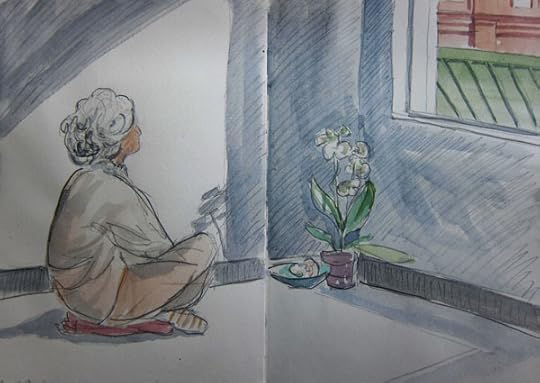Notes from an Urban Retreat - III
Saturday evening: I linger in the cathedral after evensong. For a while I sit in the little chapel behind the choir stalls, practicing in my head the passages from Genesis that I'll be reading tonight. The readers have all been very good so far - they've clearly taken it seriously and prepared beforehand - and I don't want to screw up. The verger is mopping the black-and-white tile floor of the nave, back and forth, back and forth. Before I leave, I notice the candle-stand as I walk past, then turn around and decide to light a candle for my mother and father-in-law, neither of whom would have done such a thing themselves. There's another candle burning beside mine, and someone has drawn a heart around its base, which makes me smile. With my finger I trace "Allah" in Arabic, from right to left, in the sand.
Before dinner I sit down at one of the art project tables, and take out the question sheets that Paul gave us after the second and third talks. Nothing's compulsory! he said. Work with these if they seem helpful, ignore them if you want.
Each sheet is divided into four quadrants, for the various characters in the Jacob stories, with an adjective and some questions: "Bound like Isaac: What do I bring from my childhood/past that still binds me? How does this show itself?" "Fiery like Esau: Where/how do I satisfy my passions? What do I sacrifice for my passions?" "Birthing like Rebekah: What am I trying to bring to birth in my life/creativity? How do my hopes and dreams struggle with one another?" "Deceiving like Jacob: What do I long to possess above all things? Who do I use/misuse in order to possess it?" These are significant questions. I spend the time before the meal pondering them, and making some notes; I'm surprised to see some truths emerge that I hadn't admitted to myself before.
Paul has put on music during each of the meals, usually liturgical chants or hymns, but for this dinner, he surprises us with a flute trio playing funny arrangements of familiar showtunes, and soon we're all grinning.The tables are covered with tablecloths and some of V.'s collection of colorful printed and embroidered linens; there are daffodils in small glass vases and a bouquet of yellow tulips. There's wine, too, and at our table we silently propose a toast to one another: it's a celebration. The participants have done another good thing: without being asked or prompted, we've all changed places for each meal. It's odd how much we've learned about each other without talking. After the small glass of wine, one of the women across from me - about my age - suddenly starts peeling off layers; she's having a hot flash. The woman next to her follows suit, and then I'm hot -- and we all start laughing again. The first woman gets up and opens a window. The other tables have caught on and they're silently laughing too; then we all settle down, but the humor has been good for us.
At 8:30 we gather for the final reading and talk -- Jacob wrestles with the angel -- followed by Compline. It's dark except for the three candles and a dim glow from the outer rooms. We've walked with Jacob from the shallowness and dishonesty of his youth, through his long years of labor in order to win Laban's daughter Rachel in marriage, and now he has sent his two wives, two maids, 11 children and all his flocks and possessions across the river Jabok, and stands alone to wrestle through the night with an unnamed man, perhaps an angel, perhaps God himself. And though he prevails - the man cannot overcome him - Jacob is wounded in the hip, so that forever after, he limps. But during the struggle, as dawn breaks, Jacob refuses to let his assailant go unless he blesses him. The man asks Jacob's name, and then gives him his blessing along with a new name: "Israel," the one who strives with God. Tell me your name, Jacob asks, but the man refuses, and as the sun come up, he disappears. Jacob walks ahead to rejoin his household: limping, but blessed.
We're silent after Compline, and unlike the other nights, no one moves from their seats. Paul rises and tells us softly that he has brought Oil of Chrism, and if any of us woudl like it, he would like to anoint us and ask for a blessing. It's not the consecrated oil we use for the sick, it's the oil we use for baptism, he explains, and in this case we call it the Oil of Vocation.
There's silence. None of us have done this before, or so it seems. We hesitate. Then someone gets to their feet and stands before Paul. He places his hands on her head and prays so softly none of us can hear the words, and then puts oil on her forehead. Then he takes her hands, first one and then the other, and puts oil in the shape of a cross on her palms. Vocation. And I think of the words of St. Teresa of Avila: Christ has no body now but yours,/No hands, no feet, on earth but yours. Another person rises to her feet; again I feel tears in my eyes, and eventually I get up too.
This is why we have ritual, I tell myself. To go beyond ourselves and beyond ordinary reality into the symbolic world. Here we have stepped apart from our normal everyday lives into our personal solitudes, but we cannot remain indefinitely. The point is to go back, but remembering, processing, and changing even if it's not a transformation we can immediately see. Ultimately though, the transformation is not just about us, or even for us, but for the world. And a retreat is a concentrated period in which we can, ideally, deepen, re-learn, or re-commit to a daily practice in which we turn inward toward what is holy, and then back out to the world.
When I look down at my hands in the weeks to come, I am going to remember this moment, and maybe I will actually be moved to do something about it. The bread and the wine are weekly reminders, too; a chance to renew myself, to speak in my heart about the things left undone, and those I ought not to have done; to look forward with hope, intention, and renewed strength for the journey. But as powerful as that weekly ritual remains for me, this is something unexpected and deeply personal, meant to seal in each of us whatever we have learned during these short days. I'm quite moved. I sit for a while, and then go home into the night.
---
On Sunday morning we gather again for morning prayer at 8 am; I'm one of the last to arrive and come rushing up the stairs with my bicycle helmet - it's a gorgeous day - to find the whole group gathered on the old pews that line the long sunny hallway that joins the office tower to the cathedral. They smile and I sit down. After the prayers we go to the dining area, and the silence is lifted! Everyone talks, smiles; we've all made new friends in total silence, how strange! We enjoy our meal together, and then Paul asks us if, before leaving, we'd like to share anything about the experience we've had. There will be a request for practical feedback later, he tells us, so not that -- just -- the other stuff! But only if you want. One by one, the participants offer a few words. I was afraid of the silence, says one, I've never done anything like this, but then I realized we were all supporting each other, and it became easy. I'm grateful. A number of us speak, several people commenting that the anointing the previous night had been unexpected and moving. After we finish, Paul says, yes, it was very moving for me too. But at the end, I was standing there alone, and the thought that came into my mind was, what about me? Does anyone have a blessing for me? And two people did come up and speak to me, they had realized this, and that meant a lot.
This seems to be the last word; but it feels too unfinished to me. I raise my hand and look around the room: Let's gather around V. and Paul, and thank them and say a prayer before we go, can we do that? Everyone immediately gets up and forms a cluster; we are all holding one another, with bowed heads, and there is silence. I realize they are waiting for me to speak, so I take a breath, and say a brief prayer of thanks for each of these people who has given so much, and ask God to bless them. I see tears falling to the floor, unchecked, from several pairs of eyes; then we slowly let go, and head down to the cathedral to rejoin our families, the choir, the community.




